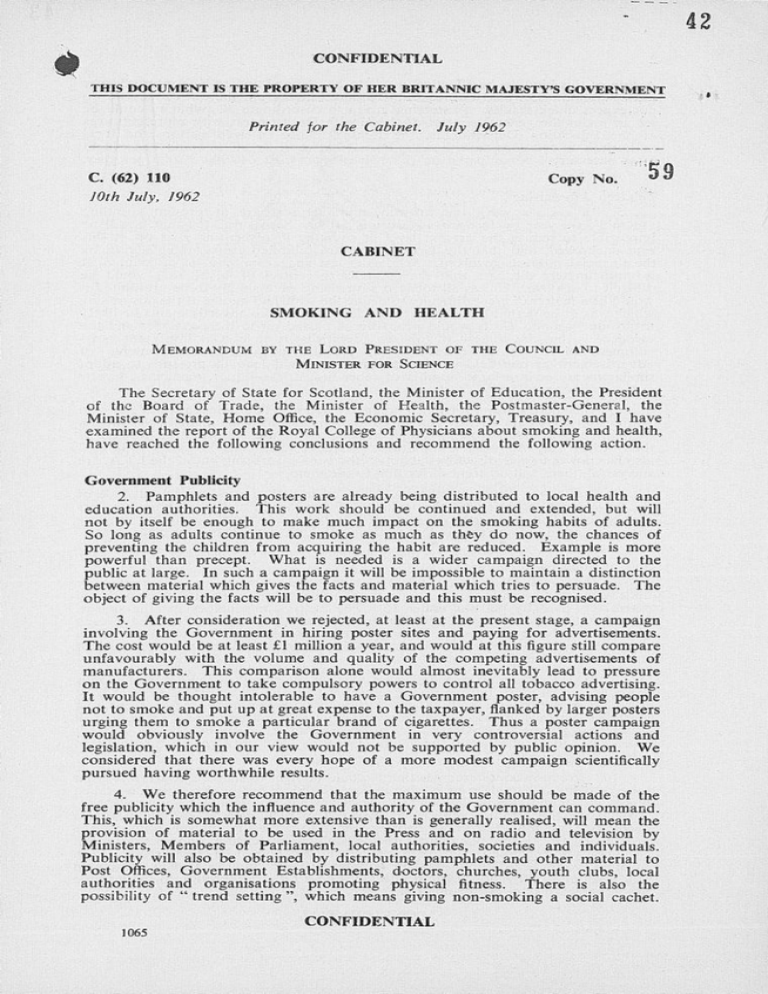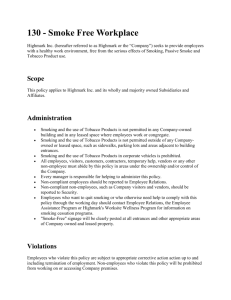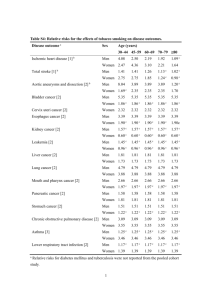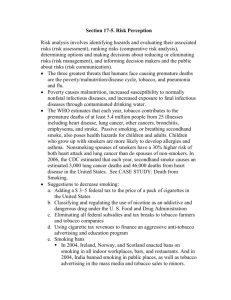THIS DOCUMENT IS THE PROPERTY OF HER BRITANNIC MAJESTY'S GOVERNMENT
advertisement

THIS DOCUMENT IS THE PROPERTY OF HER BRITANNIC MAJESTY'S GOVERNMENT Printed for the Cabinet. July 1962 C (62) 110 10th July, Copy No. 59 1962 CABINET SMOKING AND HEALTH MEMORANDUM BY THE LORD PRESIDENT OF THE COUNCIL AND MINISTER FOR SCIENCE The Secretary of State for Scotland, the Minister of Education, the President of the Board of Trade, the Minister of Health, the Postmaster-General, the Minister of State, Home Office, the Economic Secretary, Treasury, and I have examined the report of the Royal College of Physicians about smoking and health, have reached the following conclusions and recommend the following action. Government Publicity 2. Pamphlets and posters are already being distributed to local health and education authorities. This work should be continued and extended, but will not by itself be enough to make much impact on the smoking habits of adults. So long as adults continue to smoke as much as they do now, the chances of preventing the children from acquiring the habit are reduced. Example is more powerful than precept. What is needed is a wider campaign directed to the public at large. In such a campaign it will be impossible to maintain a distinction between material which gives the facts and material which tries to persuade. The object of giving the facts will be to persuade and this must be recognised. 3. After consideration we rejected, at least at the present stage, a campaign involving the Government in hiring poster sites and paying for advertisements. T h e cost would be at least £1 million a year, and would at this figure still compare unfavourably with the volume and quality of the competing advertisements of manufacturers. This comparison alone would almost inevitably lead to pressure on the Government to take compulsory powers to control all tobacco advertising. It would be thought intolerable to have a Government poster, advising people not to smoke and put up at great expense to the taxpayer, flanked by larger posters urging them to smoke a particular brand of cigarettes. Thus a poster campaign would obviously involve the Government in very controversial actions and legislation, which in our view would not be supported by public opinion. We considered that there was every hope of a more modest campaign scientifically pursued having worthwhile results. 4. We therefore recommend that the maximum use should be made of the free publicity which the influence and authority of the Government can command. This, which is somewhat more extensive than is generally realised, will mean the provision of material to be used in the Press and on radio and television by Ministers, Members of Parliament, local authorities, societies and individuals. Publicity will also be obtained by distributing pamphlets and other material to Post Offices, Government Establishments, doctors, churches, youth clubs, local authorities and organisations promoting physical fitness. There is also the possibility of " trend setting ", which means giving non-smoking a social cachet. Action of this kind, to be effective, needs to be planned and to be continued over a long period. It would be necessary to make clear from the outset that we do not expect quick results. A steering group to co-ordinate all publicity could be set up under the general control of the Health Departments with representatives of the Education Departments, the Central Office of Information, the local authorities associations, and the doctors. Other representatives could be brought in as necessary. A campaign on these lines might cost £40,000-50,000 per year. Tobacco Advertising 5. In various ways the tobacco manufacturers are at present spending £11 million a year on tobacco advertising. It has been suggested that it will be impossible to reduce the present level of smoking if advertising goes on at this rate unchecked, and that the Government are inhibited from taking action by the financial interests involved. While the last suggestion can be discounted, it is unfortunately the case that the compulsory control of advertising would be difficult to achieve. Unless all tobacco advertising were simply to be prohibited it would be a matter of great difficulty to define the scale and nature of the advertising which was to be permitted. Nor would a levy on tobacco advertisements be likely to do much good. Costs would probably be passed on to the consumer and the evidence is that the content of tobacco advertising is at least as important as its volume. Moreover an endeavour to prohibit or censor the contents of advertisement in one field of this importance would lead to pressure to adopt similar measures in a large number of other industries—-liquor, medicines, sweets and consumer goods of all sorts. 6. But there is room for much voluntary action. The Independent Television Authority (I.T.A.) are already convinced that changes must be made in the themes used in certain advertisements and if necessary will use the statutory powers of their Advertising Advisory Committee to achieve this. The Postmaster-General also has power to give directions about methods of advertising but, if the I.T.A. are successful, there will be no need for him to use them. 7. Voluntary action in other publicity media will, depend on the attitude of the newspaper proprietors, the owners of hoardings and the manufacturers themselves. The manufacturers may well be prepared to co-operate by reducing the scale and modifying the content of their publicity, particularly for cigarettes. Sale of Tobacco to Children 8. The existing law makes it an offence to sell cigarettes to a person apparently under the age of 16 and enables a court to take steps to prevent a slot machine being extensively used by persons under 16. The maximum penalties for the sale of cigarettes to children are £2 for the first, £5 for the second and £10 for each subsequent offence; for failing to bring a slot machine under proper control in accordance with a court order, the maximum penalty is £5 with up to £1 a day for each day the offence continues. 9. These maximum penalties were fixed at a time when the value of money was a good deal more and we recommend that they should be increased to at least £25, £50 and £100 for sale to children with corresponding increases for slot machines. It must be recognised, however, that this will be more a political than a practical gesture. Convictions under the existing law are notoriously difficult to obtain, and an increase in the maximum penalty will not improve the detection rate. 10. We have Considered whether it would be right to enable a court to prevent tobacco being sold at all in cases where sales to children can be shown to have taken place. After a full examination we are clear that this would be unproductive. Apart from the technical difficulties involved in defining and enforcing such a prohibition, we should be under strong pressure to reserve the power to impose the prohibition to the superior courts; the difficulties in securing a conviction which are already formidable would be multiplied if cases had to be tried before a jury. In other words, legislation would be complicated and would be likely to remain a dead letter. The real safeguard here must be a radical alteration in the attitude of the public to smoking by children. Smoking in Public Places 11. We do not recommend legislation to prevent smoking in public places. So long as the managers of, e.g., cinemas, restaurants and shops, believe that a ban on smoking would damage their trade, they would be unlikely to co-operate. The difficulties of enforcement would be greatly increased and it would probably be necessary to put the burden on the police rather than on the management by making smoking in prohibited places an offence. We leave the results to the imagination of our colleagues. 12. Here again an improvement can only come about when there has been a change in public opinion and we should do all we can to encourage voluntary action to this end. There is a strong case for discouraging smoking in stores, particularly those of the supermarket type where food is sold. Messrs. Marks and Spencer have already shown the way and we must do what we can to encourage other organisations to follow suit. 13. T h e Government should themselves take a lead in this by putting up " Please do not smoke " signs in suitable Government premises to which the public have regular access. It would be unwise to enforce these notices by legal means, but we can reasonably look to the co-operation of the public and the help of the staffs of those offices in seeing that the ban is effective. The signs might be coupled with one of the posters showing the dangers of smoking. 14. T h e same considerations apply to public and municipal transport. For the most part smoking can be prohibited on railways or buses under the relevant bye-laws. We should encourage the competent authorities t o review the present scales of non-smoking accommodation and increase them where possible. Taxation 15. We have been unable to reach an agreed view about imposition of a differential tax which would make cigarettes more expensive and pipe tobacco and cigars cheaper. It would be possible, by recasting the present tax structure, to devise such a tax; but in the view of the Customs and Excise if it were substantial enough to have any real impact, ways and means could easily be found of avoiding it. We agreed that if imposed it should not be so high, e.g., a 50 or 100 per cent, increase in the price of cigarettes, as to produce an immediate and substantial effect. Such a tax would be manifestly unfair to the poor and as mentioned above could be widely evaded. We also agreed that a differential tax should not be so low that it would be written off as a mere political gesture. 16. But some of us considered that there would be merit in a differential tax which would have a marginal effect on consumption, e.g., by raising the price of a packet of cigarettes by say 10 per cent, (from 4s. 6d. to 5s.) and by dropping the price of pipe tobacco by 20 per cent, or so. In favour of such a course it could be argued that taken in conjunction with the other measures which we recommend it would show that the Government take the cigarette problem seriously, and that conversely it would be wrong for the Government to refrain from making a positive move in the one field in which it is obviously open for them to do so. It might also produce over a period a significant change in smoking habits, since it would reinforce the effect of our general publicity. It would, in other words, provide a practical incentive to cut down smoking or to change to a pipe, whereas in the absence of such an incentive the publicity might result in no more than good intentions. There is some evidence from earlier surveys that many smokers would like to cut down, but need some positive spur before actually doing so. Moreover, if the measures we have recommended above have any effect at all—and it would be a counsel of despair to assume they would not—the Revenue will be the loser unless counter-measures are taken. 17. As against this it must be admitted that even a small differential tax would bear hardly on the poor and the old, for many of whom smoking is a real solace and who, particularly the women, would find it difficult or impossible to change the habit of a life time. And if the Royal College are right (though they are hardly qualified to express the opinion) in saying that, on the basis of the evidence, increased taxation would be unlikely to have any lasting effect, we might be inflicting hardship to no good purpose. Furthermore, it is the view of the Customs and Excise that increased taxation would be unlikely to have any lasting effect on the demand for cigarettes unless the differential were sufficient to raise the retail price of cigarettes by 50 per cent, at least, and possibly by nearer 100 per cent. A differential tax might also be criticised in principle as a wrong use of taxation. 18. We seek the views of the Cabinet on this point. Other Measures 19. We do not recommend that cigarette packets should be marked by an official agency to show the yield of tar, volatile irritants and nicotine per gramme of cigarette. In the first place it has not been possible to establish any direct connection between these substances and lung cancer and the knowledge that certain brands of cigarettes had a comparatively low yield might encourage a false sense of confidence. In the second place, the yield would probably have to be expressed in terms of a maximum, i.e., " the contents of this package are guaranteed not to produce more than x grammes of tar, etc.". This again might tend to encourage rather than discourage the smoker. 20. The Royal College recommend organisation of experimental anti­ smoking clinics. This recommendation has already been accepted in principle by the Ministry of Health. A small number of experimental anti-smoking clinics will be set up and the results will be reviewed in about two years' time. 21. It has been agreed to charge no duty on cigarettes used in research by the tobacco industry into the harmful effects of smoking. Publicity would not normally be given to an extra-statutory concession of this sort, but it may be worth mentioning in any general statement of the action we are taking. The concession will not become an awkward precedent. Summary 22. Subject to a decision about taxation I invite the Cabinet to agree that action should proceed on the lines I have suggested and to authorise me to co-ordinate action in consultation with the other Ministers concerned. It would also be advisable to announce in Parliament the results of our consideration of the Royal College's report and if the Cabinet accept my views I will arrange for the preparation of a draft statement by the Prime Minister. HAILSHAM. t Office of the Lord President of the Council and Minister for Science, S.W. 1. 9th July, 1962.


